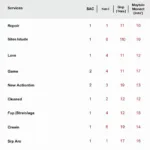Car service in Germany is renowned for its high quality, technical expertise, and meticulous attention to detail. Whether you’re a local resident or a tourist driving through the picturesque German autobahns, understanding the nuances of car service in this automotive powerhouse is crucial. This guide will delve into everything you need to know about car service in Germany, from finding a reputable workshop to understanding the costs involved.
Finding the Right Car Service in Germany
Locating a reliable car service center in Germany can be a straightforward process if you know where to look. Many authorized dealerships offer comprehensive services for specific car brands. Independent garages, often family-owned, provide a more personalized approach and competitive pricing. Online directories and review platforms like Yelp and Google Reviews are excellent resources for finding local recommendations and comparing services. Word-of-mouth referrals from locals can also be invaluable.
What are the key factors to consider when choosing a car service in Germany? Expertise in specific car makes, availability of specialized tools, and transparent pricing are essential. Furthermore, consider the garage’s certifications, customer reviews, and proximity to your location or travel route.
Understanding German Car Service Costs
Car service costs in Germany can vary based on several factors, including the type of service required, the car’s make and model, and the region. Routine maintenance like oil changes and tire rotations tends to be more affordable than complex repairs. Luxury car brands typically command higher service charges due to specialized parts and expertise. Urban areas might have slightly higher labor costs compared to rural regions. Requesting a detailed quote upfront can help you avoid surprises and compare pricing across different workshops.
What is the average cost for an oil change in Germany? While it varies, expect to pay between €80 and €150 for a standard oil change including the filter and labor.
Navigating German Car Service Regulations
Germany has stringent regulations regarding vehicle maintenance and roadworthiness. Regular inspections, known as “Hauptuntersuchung” (HU), are mandatory for all vehicles after a certain age. These inspections ensure that vehicles meet safety and environmental standards. Failing to comply with HU regulations can result in fines and even vehicle immobilization. Make sure your chosen car service center is authorized to perform HU inspections. Keeping your car well-maintained not only ensures road safety but also helps retain its resale value.
What happens during a Hauptuntersuchung? The inspection covers various aspects, including brakes, lights, tires, emissions, and overall vehicle condition. A qualified inspector meticulously examines the vehicle to ensure it meets the required standards.
Emergency Car Services in Germany
Experiencing a car breakdown in Germany can be stressful, but the country has a well-established system for handling roadside assistance. Most major automobile clubs, such as ADAC, offer comprehensive breakdown services to members. These services typically include towing, on-site repairs, and transportation. If you’re not a member of an automobile club, many car insurance policies provide roadside assistance coverage. Having the contact information for your insurer or a reputable towing service readily available can save you valuable time and hassle in case of an emergency.
What should I do if I experience a breakdown on the Autobahn? Pull over to the emergency lane, turn on your hazard lights, and place a warning triangle behind your vehicle. Then, contact your roadside assistance provider or the emergency services.
Conclusion
Car service in Germany, with its focus on quality and adherence to regulations, offers a reliable and efficient experience for both residents and visitors. By understanding the intricacies of finding the right workshop, understanding costs, and navigating the regulations, you can ensure a smooth and hassle-free car service experience in Germany.
FAQ
-
How often should I service my car in Germany? Generally, following the manufacturer’s recommended service intervals is advisable.
-
Do I need to speak German to get my car serviced in Germany? While some smaller garages might primarily communicate in German, many larger service centers and dealerships have English-speaking staff.
-
Can I use my own parts for car service in Germany? While it’s possible, most workshops prefer using their own parts as they can guarantee their quality and offer warranties.
-
Are there mobile car service options in Germany? Yes, several companies provide mobile car service, bringing the workshop to your location for added convenience.
-
What payment methods are accepted at car service centers in Germany? Most workshops accept cash, debit cards, and major credit cards.
-
Can I negotiate car service prices in Germany? While it’s not always common, negotiating prices, especially for larger repairs, might be possible.
-
What should I check before leaving a car service center in Germany? Ensure you receive a detailed invoice outlining the services performed and associated costs, and verify that any issues you reported have been addressed.
You might also be interested in reading about german names for cars services. For additional information on maintaining your specific car model, check out our other articles on CarServiceRemote.
Need help with car service in Germany? Contact us via WhatsApp: +1(641)206-8880 or Email: [email protected]. Our customer service team is available 24/7.

